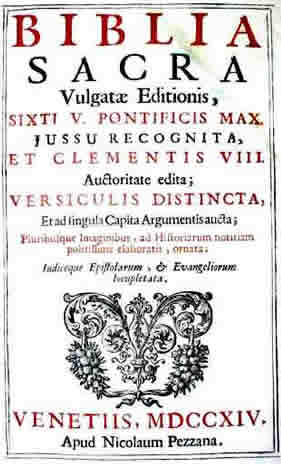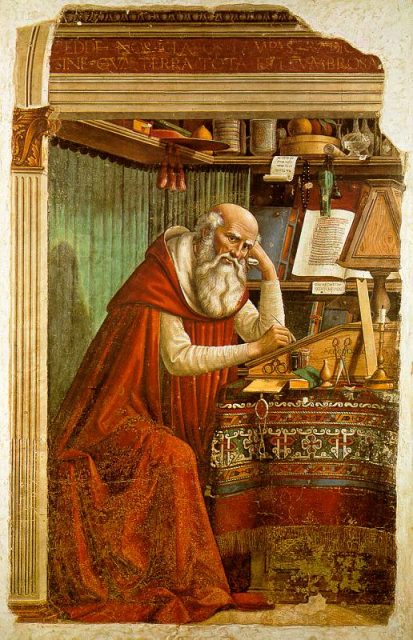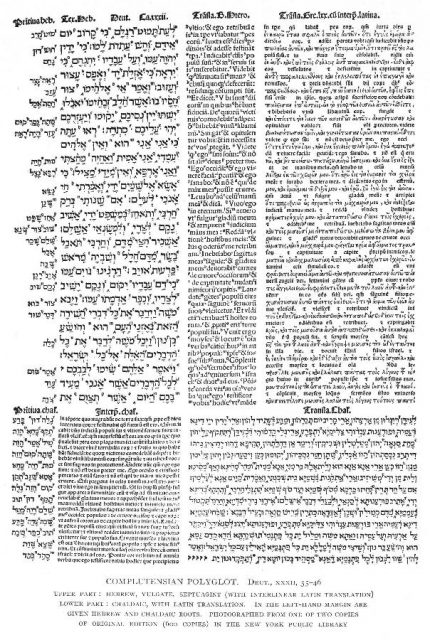Skepticism, a short uncertain story (7): The Vulgate wars
Skepticism, a short uncertain story (7): The Vulgate wars
If you have been following this series, I guess you will by now have learned a few surprising details about the history of western thought. For example, the fact that Ancient skeptics considered that it was suspension of belief, rather than the search for certainty, what most plausibly could lead us to happiness (through the virtue of imperturbability: ataraxía); or the fact that radical empiricism, though usually associated in contemporary times to some type of idealism (the view that mental-stuff-made ‘sense-data’ are our only direct access to knowledge), was considered till the beginning of the Enlightenment as the most typical form of materialism; or the fact that the target of most skeptics’ works, at least till the first centuries of Modern Age, was not ‘faith’, or ‘religion’ at all, but mainly what at their contemporaries took as ‘science’. We shall make a brief detour in the chronology of our history of skepticism (that in the previous entry had reached the work of Hume at the peak of the Enlightment), in order to look over the convoluted story of how religion ended being the most paradigmatic victim of skeptic arguments.

Of course, it had been our good-old-fashioned Greek philosophers who have started to offer something like a ‘rational critique of religion’. For example, the pre-Socratic Xenophanes of Colophon (6th century B.C.) had already exposed the irrationality of attributing anthropomorphic qualities to the gods, and the Epicureans had also submitted to radical scrutiny the traditional practices associated to established religions as long as they were based on mistaken ideas about the nature of the gods (who, according to Epicurus, were so perfect and happy that didn’t care a dime by our human miseries). But, as we saw in the third and fourth entries of our series, most of the few Middle Age and Renaissance authors that (to some limited extent) might be classified as ‘skeptics’ didn’t target their arguments against the ‘truths of (Christian, or Muslim, or Hebrew) revelation’, i.e., against religious faith, but rather against the standard philosophical theories of their time. Furthermore, in many cases their skepticism was rather a weapon against the possible superiority of rational enquiry over religious faith.
However, for more than a millenium of contact with philosophical theories, monotheistic religions hadn’t had an easy relation with these. The Platonic philosopher Celsus (2nd century CE) had offered a devastating disparagement of some central Christian claims, showing how literally absurd they were from a rational point of view, but the work of a colossal army of theologians during the next centuries (starting with Celsus’ immediate critic, Origen) had helped to build a complex philosophical scaffolding that served to make the dogmas of religion more or less swallowable for regular logical minds, but most of the attempts to elaborate a dialogue between revelation and one or other classical philosopher had led to a myriad of skirmishes, and not always bloodless ones, and not without insisting that, however, the relations between ‘reason’ and ‘faith’ might be stated, the latter was immensely superior to the former as a foundation of our knowledge of God and our salvation.
Under the religions ‘of the Book’, the notions of ‘faith’ and ‘revelation’ were hardly distinguishable from their respective sacred texts themselves, the Torah, the Bible, or the Kuran. Actually, the youngest of the three big monotheistic religions was so conscious of that identity that, since the beginning, it devoted every possible effort to preserve the integrity of its own sacred book, a human effort that, of course, though much more successful than in the case of the Christian and Hebrew Bible, could not have been absolutely infallible. This means that the rational scrutiny of the sacred texts could always be a substantial danger for the integrity of the faith, and those religions tried to build a formidable institutional protective wall that could prevent that the study of their Books was done in inconvenient places or by inappropriate people. It was, of course, Renaissance humanists who took the obvious step of thinking that, what they were doing in order to ‘recover’ the purity of texts of classic Greek and Latin philosophers, poets, grammarians, and historians, could also be done in order to analyse the biblical texts themselves.

The case was still clearer for Roman Catholics (as compared not only to Hebrews and Muslims but to Greek orthodox Christians), for in their case the sacred, revered and assumedly inerrant text was nothing else than a translation, a translation largely performed by one single man, St. Jerome, between the 4th and 5th centuries. It was this Latin text, known as the Vulgate, the one that was used not only in the Catholic masses, but as the most legitimate source of quotations whenever someone wanted to back any opinion, sentence, or discourse with ‘the word of God’. But of course, Catholics couldn’t really pretend that their God ‘speaks’ Latin as Muslims do pretend that Allah ‘speaks’ Arabic. Neither Moses, nor Jesus, nor Paul spoke or wrote in the language of Julius Caesar (Paul perhaps could speak it if it is true that he was a Roman citizen, but all his preserved writings are in Greek, even his Letter to the Romans), and on top of that, contrarily to the case of the Kuran, the Christian Bible, and particularly the New Testament, is an heterogeneous collection of books written by diverse authors during a span of time of one century or more, of which many different and often conflicting copies survived, and that were immersed in a pool of many other texts (later known as the ‘Apocrypha’) equally reclaiming for themselves the authenticity associated to Christ’s Apostles or at least that of their first followers.

For many humanists of the Renaissance, the temptation of applying their philological savoir-faire to the problem of establishing a proper edition of the Greek text of the New Testament, as well as a proper translation of it into Latin, must have been incredibly exciting. It was Erasmus of Rotterdam, whom we have already met in passing a few entries ago, the first humanist in completing such a work, in a formidable priority race against the publishers of the Complutensian Polyglot Bible: Erasmus published the first printed edition of the Greek New Testament (under the title of Novum Instrumentum, and later known as Textus Receptus) in 1516, whereas the scholars in charge of the edition of the Alcalá Bible, comissioned by cardinal Cisneros to a team whose director was Diego López de Zúñiga, didn’t see it published till 1520 (though it is possible that the New Testament translation had been completed and printed already by 1514, after ten years of work, though it was only published six years later, when the whole Bible edition was ready). In his command to work on the new edition of the Bible, Cisneros had stated that his main goal was “to revive the hitherto dormant study of the scriptures” with the help of the best possible scholars; he tried to enrol Erasmus himself in the team (to which several converted Jews belonged), but the Flemish refused, preferring to work on his own project, and probably having access to a larger set of Greek manuscripts in German and Italian libraries. Erasmus’ refusal gave occasion to his famous phrase “non placet Hispania” (in a letter to Thomas More), what some attribute to his disliking the prevalence of people of Hebrew origin within the Spanish academia of the time.
Humanists had three fundamental concerns regarding the Vulgate. First, the text, through more than a millenium of copying manuscript after manuscript one by one, had been corrupted to an inadmissible degree for a philologist; so, by the 15th century, knowing what exactly the text of Jerome’s translation had been had become a serious problem in many cases, for different manuscripts contained different readings at many points. Second, the fact, already mentioned, that the Vulgate was after all a mere translation, and a good edition of the Greek text itself (particularly of the New Testament) was needed in order to illuminate the true sense of God’s revelation to the inspired writers. And third, and not less important, the fact that the Vulgate language was… exactly that: vulgar (yes, it was). The Lusitanian pope Damasus I had commissioned Jerome by the end of the 4th century with a translation of the Bible to an idiom that most Latin speaking people of the time could easily understand, for most of the partial translations already existing (what later became known as Vetus Latina) had been poured into a rather ‘classical’ (i.e., Ciceronian) language, a language that, to almost everyone except the most learned, had become by that time not totally unintelligible, but greatly so, especially because most of the Latin speakers of the time were not of Roman origins. The grammatical and lexical subtleties of a Virgil or a Lucretius, that more than a millenium later will make the delights of the humanists, had been literally crushed by generation after generation of ‘barbarians’ that, across the Empire, had been forced to learn Latin as adults, or from people that had learnt it that way; a Latin they didn’t have received, on the other hand, from the exalted writings of poets, by from the coarse mouths of rustic sergeants. Jerome’s work was, hence, that of translating the Bible to vulgar Latin. By the way, most of the texts of the New Testament had not been originally written in a very elevated Greek, to say the least, and so a Ciceronian translation of them was certainly a ‘betrayal’ in a sense.

Nonetheless, the effort of producing a better edition and translation of the Bible could hardly be kept in the tranquil waters of philological erudition. Zúñiga, for example, authored several pamphlets against Erasmus, accusing him of being much better a philologist than a theologian (or, to be more precise, of knowing and understanding much better the Latin classics than the Fathers of the Church, on whose comments to the Biblical texts many of Jerome’s lexical choices were based). From the Spaniard’s point of view, this had led Erasmus to commit blatant mistakes in his translation, offering readings that could be used to justify almost any conceivable heresy, and that soon were associated to the most hated villain of the time both in Rome and in Spain (Martin Luther), in spite of Erasmus’ indication that he had published lots of works criticizing the theses of the German reformer and defending the legitimacy of the Church. Just to give a couple of examples: Erasmus’ translation says mysterium or arcanum in the passages in which the Vulgate refers to marriage as a sacramentum, what could be interpreted as a denial of the Church power. He also chooses to translate the Greek kyriótetos as dominium, instead as the Jeromian dominatio; this may seem a trivial difference, but Zúñiga argued that dominatio is a better option because dominationes is how the Church traditionally refered to one of the choruses of angels in the heavenly courts (remember the angelo-zoology of the Pseudo-Dyonisus from the third entry of this series). Erasmus’s own sarcastic and Epicurean answer to this last critique was that he didn’t imagine that the angels were going to feel very offended by been called “dominions” instead of “dominations”.
After many disputes like this one, a ‘definitive’ (and more or less humanist-friendly) version of the Vulgate was commissioned by the Catholic Church in the council of Trent by the mid 16th century, and was finally published in 1590, benefitting from the work of people like Zúñiga, Erasmus, and many others. By that time, however, the war around the Christian sacred text had left many decades ago the field of libraries and universities, to install itself in a non-reversible way in the breakdown of Western Christianity. Even the idea of producing an authoritative and updated Latin version of the Bible had been rendered obsolete by the Protestants’ defence of each Christian’s freedom to read the sacred text in his own vernacular language… a claim that surely the Lusitan pope Damasus would have understood perfectly well by the end of the 4th century. But this freedom, in a moment when the vision of the world was changing so quickly and so profoundly, was soon going to become the worst enemy of the supposed truth of the Bible.
REFERENCES
Bentley, J. H. (1983), Humanists and Holy Writ: New Testament Scholarship in the Renaissance. Princeton, Princeton University Press.
Goodman, A. and A. MacKay (1990), The Impact of Humanism on Western Europe During the Renaissance, London, Taylor and Francis.
Legaspi. M. C., (2010), The Death of Scripture and the Rise of Biblical Studies, Oxford, Oxford University Press.
1 comment
[…] [Esta é unha tradución adaptada do artigo orixinal de 7 de outubro de 2015 Skepticism, a short uncertain story (7): The Vulgate wars, de Jesús Zamora Bonilla, que pode lerse nesta ligazón.] […]